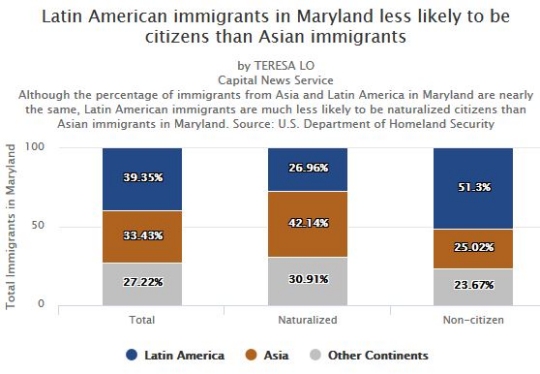
What is Mexico's policy on illegal immigration?
Under the Mexican law, illegal immigration is a felony, punishable by up to two years in prison. Immigrants who are deported and attempt to re-enter can be imprisoned for 10 years. Visa violators can be sentenced to six-year terms. Mexicans who help illegal immigrants are considered criminals.
How does Mexico treat its illegal immigrants?
Turns out, not too great.
COLLEGE PARK, Md. (Nov. 1, 2016)—Faced with a Republican candidate who threatens to identify and deport all illegal ("undocumented" in politically-correct parlance) immigrants on his first day in office, many Maryland Latino voters see the election as an opportunity to send a message from those unable to speak for themselves.
University of Maryland undergraduate student Tatiana Escobar, 20, a naturalized citizen as of Oct. 5, said she feels that it is her duty to vote for Democratic presidential nominee Hillary Clinton on Election Day now that she has the privilege.
"Voting gives people voices," she told Capital News Service. "Maybe some people don't see it that way, but I really do think that way and mainly in a presidential election…we need to focus on who we elect as commander-in-chief."
Latino voters are a growing portion of Maryland's electorate, and many feel solidarity with undocumented friends and family unable to cast ballots. They feel that Republican presidential nominee Donald Trump's promise to deport immigrants without proper papers has struck close to home.
"The reality is we all know someone who is undocumented," said Janet Hernandez, senior civic engagement project manager for Washington-based National Council of La Raza. "When people vote, they're going to vote with that in mind."
La Raza's Action PAC has endorsed Clinton.
If Trump became president and deported all of the illegal immigrants in the country, Maryland would lose $15.3 billion in economic activity as well as a loss of approximately 73,267 jobs, according to the American Immigration Council, a Washington-based nonprofit organization.
Trump has made building a wall along the United States-Mexico border a centerpiece of his campaign. On the day he announced his candidacy, he said Mexico was "sending people that have lots of problems, and they're bringing those problems with (them). They're bringing drugs. They're bringing crime. They're rapists. And some, I assume, are good people."
Nearly 50 percent (420,334 people) of all immigrants in Maryland in 2013 were naturalized citizens with the right to vote, according to the council.
Escobar, who is originally from El Salvador and immigrated to the United States with her mother in 1999, said she always felt like she belonged in this country.
"Being a legal resident honestly has felt the same," she said. "I have not felt that there was anything that was different. When I became a citizen, at that moment, it felt great to know that you're finally a citizen after living here for so many years."
Maryland's Latino population accounted for 3.9 percent of Maryland voters in the 2012 election, according to U.S. Census data, and is on track to become an increasingly larger factor in elections.
In the 2012 presidential election, 44.6 percent of Hispanics living in Maryland voted, according to U.S. Census data. That's more than a 10 point increase from the election of 2008, when 34 percent of Maryland Hispanics headed to polls.
On Oct. 17, a Latino Decisions poll found that 76 percent of registered Latino voters said Trump's pledge to identify and remove up to 6 million undocumented immigrants made them less likely to vote for the Republican candidate.
That's up 10 percent from the beginning of September, when 66 percent of Latino voters said they were unlikely to support Trump.
"We are hearing that on the ground, people are talking more and more about this hateful rhetoric," Hernandez said.
Nationwide, Latinos are poised to cast the most lopsided presidential vote in history. Latino Decisions predicts that just 15 percent of Latino voters will support Trump; the lowest fraction of that population to vote for a Republican candidate.
Juan Cortez, 26, a newly registered Latino voter in Washington, said he feels obligated to vote on behalf of undocumented immigrants.
"We are in a position where we can not only cast a vote, but represent folks who want to be placing their votes, but they can't, because they're not allowed," he said.
Cortez plans to vote for Clinton, he said.
Maryland's illegal immigrant population has been declining. A Center for Migration Studies paper found that there were 233,000 illegal immigrants living in the state in 2014, a 2 percent decrease from 2010.
This mirrors national trends. The same paper found that the nation's total illegal population has declined every year since 2008, falling below 11 million in 2014 for the first time since 2004.
Thirty-two percent of illegal immigrants living in Maryland in 2012 were from El Salvador, 12 percent were from Guatemala, and 12 percent were from Mexico, according a 2014 study by the Pew Research Center.
However, undocumented immigrants still will have an impact on the election, said Luis Aguilar, the head of the immigrant advocacy group CASA de Maryland's political outreach program. The political outreach program, CASA in Action, endorsed Clinton for president.
"I cannot vote, but I am the one running the program," said Aguilar, who immigrated to the U.S. from Mexico under the DREAM Act and is here on a three-year work visa.
Although the outreach program, CASA in Action, focuses primarily on the swing state voters in Virginia, many of the volunteers involved are undocumented immigrants from Maryland, Aguilar said.
"I specifically tell them: whether you have documents or not, you are here to influence the election," Aguilar said. "You have family here, you have communities here."
Following this election closely, Escobar said she is certain that the Latino community will go out and vote against Trump.
"The way he discriminates isn't something that we want to see," she said.
Tatiana Escobar, a person interviewed in this story, is no relation to reporter Kimberly Escobar.


